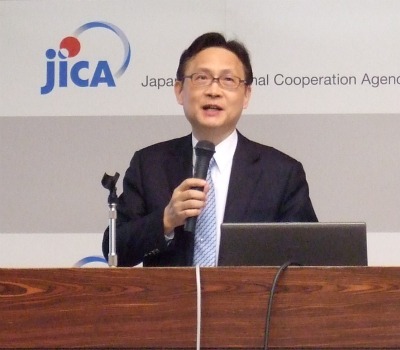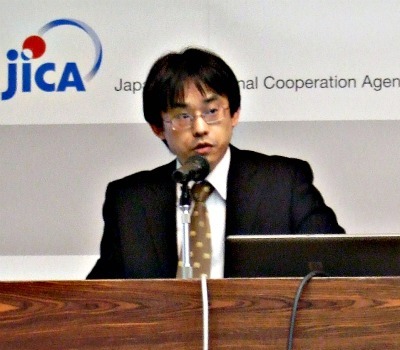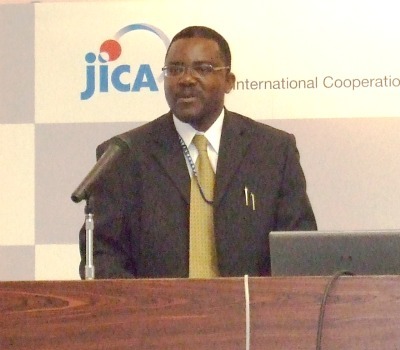JICA-RI Convened Symposium on "East Asian Economic Recovery"
2012.03.07
JICA-RI organized an open symposium "The Second East Asian Miracle?: Political Economy of Asian Responses to the 1997/98 and 2008/09 Crises" in Ichigaya, Tokyo on February 27, 2012. Some 80 people including researchers, practitioners, business people and embassy officials were in attendance at the event.
Since the 1960s, East Asia achieved rapid economic growth which has been dubbed “the East Asian Miracle.” Despite the Asian financial crisis in 1997-98, the region made a V-shaped recovery, and also overcame the 2008-09 global financial crisis with relative ease. JICA-RI's research project, which the title of the symposium was named after, aims to analyze the mechanism of the economic recovery from the most recent crisis – possibly referred to as the "Second East Asian Miracle" -- from a political-economy perspective. Nine experts involved in the project shared their analyses.

Keiichi Tsunekawa,
Senior Research Adviser

Yasunobu Okabe,
Research Fellow
Three JICA-RI researchers – senior research advisor Keiichi Tsunekawa (professor at the National Graduate Institute for Policy Studies), research fellows Yasunobu Okabe and Jean-Claude Maswana – gave presentations titled, respectively: "Japan: Political Economy of Long Stagnation;" "Financial Restructuring after the 1997 Crisis and Impact of the Lehman Shock: Path Dependence of Financial System in Korea and Thailand;" and "Reflections on the Role of the Banking Sector in China and Korea’s Export-led Growth."
In his presentation, Tsunekawa, who believes that the lack of policy coherence in Japan has become an impediment to its economic recovery, showed a concern that as their democracy will deepen, the economics of Asia’s middle-income countries might stagnate due to incoherent industrial and welfare policies.
Okabe conducted a comparative study on the financial restructuring processes of Korea and Thailand after the 1997 crisis and the impact of the 2008-09 crisis. Korea adopted a government-led approach for a more speedy recovery, but as a result of mounting short-term external debt, it almost fell into a second currency crisis after the Lehman Shock. Meanwhile, Thailand's financial restructuring process took on a slower pace but the country was able to avert the 2008-09 crisis. Okabe addressed these differences by examining the historical path of the financial system in each country.

Jean-Claude MASWANA,
Research Fellow
Maswana compared China and Korea and reported that while the banking sectors in both countries contributed to export-driven economic growth, their functions began to differ after the 1997-98 crisis, reflecting their relations with the state and their approach to foreign capitals.
Below is the list of presentations made by researchers outside of JICA-RI from countries such as the USA, Thailand, Taiwan and Korea.
Some of their studies will be published as JICA-RI Working Papers in late March to provide implications for sustainable economic development in East Asia and to reexamine the role of aid strategies in this region with growing middle-income countries.

事業事前評価表(地球規模課題対応国際科学技術協力(SATREPS)).国際協力機構 地球環境部 . 防災第一チーム. 1.案件名.国 名: フィリピン共和国.

事業事前評価表(地球規模課題対応国際科学技術協力(SATREPS)).国際協力機構 地球環境部 . 防災第一チーム. 1.案件名.国 名: フィリピン共和国.

事業事前評価表(地球規模課題対応国際科学技術協力(SATREPS)).国際協力機構 地球環境部 . 防災第一チーム. 1.案件名.国 名: フィリピン共和国.

事業事前評価表(地球規模課題対応国際科学技術協力(SATREPS)).国際協力機構 地球環境部 . 防災第一チーム. 1.案件名.国 名: フィリピン共和国.

事業事前評価表(地球規模課題対応国際科学技術協力(SATREPS)).国際協力機構 地球環境部 . 防災第一チーム. 1.案件名.国 名: フィリピン共和国.
scroll